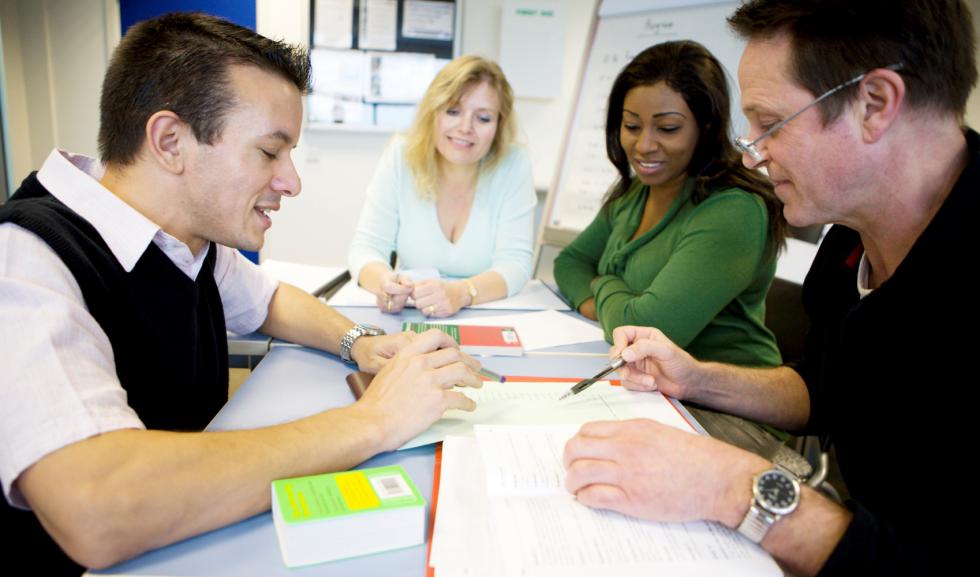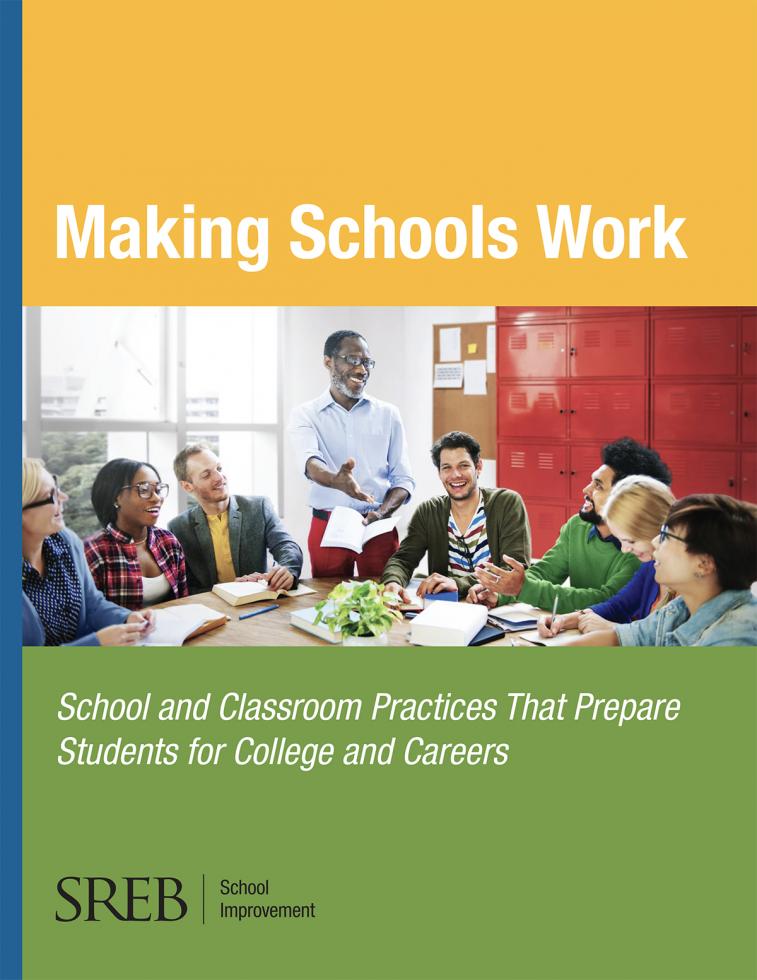School Improvement Process
School Improvement Process
SREB partners with states, districts and schools to identify and adopt strategies that help teachers, counselors and school leaders empower youth to connect the classroom with the real world. Our efforts began in 1987 with High Schools That Work, a set of transformational practices that spread to thousands of schools.
Now known as Making Schools Work, our school improvement process for grades K-12 is grounded in research showing that increased achievement starts with motivating students to succeed.
Making Schools Work
Change school practices, increase student achievement
SREB’s Making Schools Work school improvement process employs a distributed leadership approach to involve the whole school in identifying problems of practice that impact student engagement and achievement and developing plans to solve them.
With designs for elementary grades,* middle grades, high schools and technology centers, Making Schools Work empowers school teams to create improvement plans that address five focus areas:
- motivating students through engaging instruction
- aligning curricula with state readiness standards
- ensuring that students can explore careers and complete career pathways that align with their interests and aptitudes
- providing student supports that promote readiness
- creating and supporting cultures of continuous improvement
By putting a strong focus on teacher collaboration and challenging college- and career-preparatory curricula like our nine Advanced Career pathways, Making Schools Work helps schools transform their practices so that students never have to ask, “Why do I need to know this?” With Making Schools Work, students connect what they learn in the classroom with their personal interests and goals.
What Makes It Work – Our Problem-Solving Process
In schools that adopt Making Schools Work, focus teams of teachers, counselors and school leaders examine school and classroom practices and student outcomes related to the five focus areas.
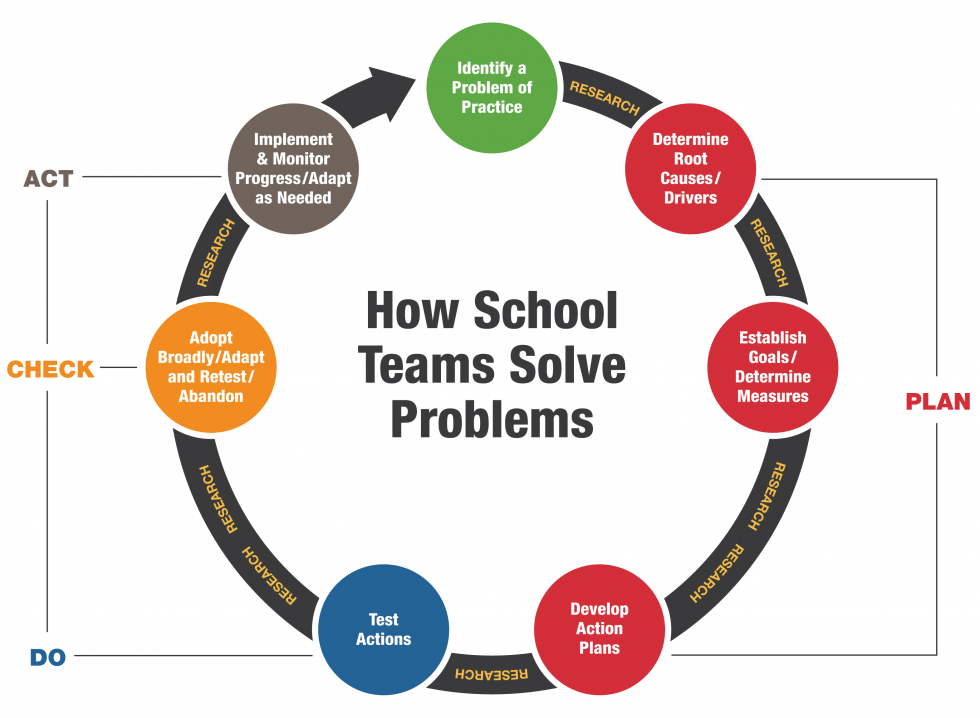 Our facilitated problem-solving process draws on engineering design principles to support focus teams as they determine actions to take to foster supportive learning environments, integrate academic and technical content, improve student achievement and empower youth to explore and achieve their career goals.
Our facilitated problem-solving process draws on engineering design principles to support focus teams as they determine actions to take to foster supportive learning environments, integrate academic and technical content, improve student achievement and empower youth to explore and achieve their career goals.
Customizable Support
Many districts and schools choose to implement the Making Schools Work process after participating in a comprehensive curriculum and instruction review or a career pathway review that examines instructional practices and opportunities across the district or school.
States, districts and schools can adopt the process at any grade level or in any setting with the exact level of support they need.
Most sites opt to receive direct support from SREB’s instructional and leadership coaches through a series of customized site development workshops and follow-up coaching and professional development services that support teams in implementing their improvement plans.
We can also prepare state or district leaders to provide support.
* under development“When educators design and implement engaging learning experiences that align with students’ interests and aptitudes, students find purpose in their learning and meet readiness standards.”
— Dale Winkler, Vice President, SREB
How a Network of Jefferson County Schools Partnered to Accelerate Sustainable Change
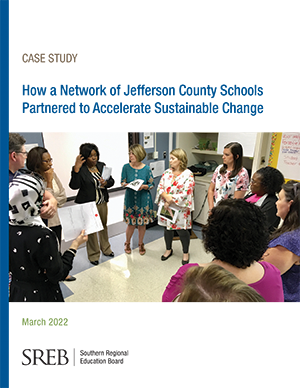 In this case study, learn how SREB
partnered with 12 schools in Jefferson County, Alabama, to form
networked improvement communities focused on promoting
meaningful, sustainable change. Their goal was simple yet bold:
Harness improvement science and continuous improvement strategies
to accelerate eighth- and ninth-grade math achievement for Black,
Latinx and low-income students.
In this case study, learn how SREB
partnered with 12 schools in Jefferson County, Alabama, to form
networked improvement communities focused on promoting
meaningful, sustainable change. Their goal was simple yet bold:
Harness improvement science and continuous improvement strategies
to accelerate eighth- and ninth-grade math achievement for Black,
Latinx and low-income students.
Three years and one pandemic later, SREB and Jefferson County educators reflected on the successes, challenges and lessons learned from their efforts.
About Our Problem-Solving Process
 As schools, districts and states
plan to use a massive infusion of recovery funds, SREB’s
research-based, classroom-tested problem-solving process can help
you ensure your efforts to improve student engagement and
achievement have a lasting impact.
As schools, districts and states
plan to use a massive infusion of recovery funds, SREB’s
research-based, classroom-tested problem-solving process can help
you ensure your efforts to improve student engagement and
achievement have a lasting impact.
In this brochure, learn how you can harness the power of our problem-solving process to sustain lasting capacity for change and meet bold goals for student achievement.
Developing Effective Interdisciplinary Focus Teams
Focus Teams Guide
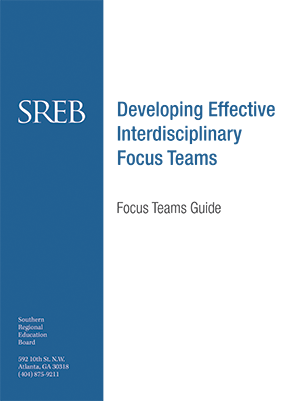 School leaders who have used the
Making Schools Work design to improve student achievement credit
the use of teacher-led focus teams that involve teachers and
school and district leaders in working together to ensure that
key school and classroom practices form the foundation for school
improvement.
School leaders who have used the
Making Schools Work design to improve student achievement credit
the use of teacher-led focus teams that involve teachers and
school and district leaders in working together to ensure that
key school and classroom practices form the foundation for school
improvement.
This guide offers an overview of SREB’s approach to using focus teams to drive and sustain successful school improvement efforts, along with helpful tools for structuring and facilitating focus team meetings.
Making Schools Work
School and Classroom Practices That Prepare Students for College and Careers
Making Schools Work
State Consortium Membership Levels
SREB’s Making Schools Work State Consortium supports member states with a customized suite of services that increase the career and college readiness of K-14 students. The consortium’s power lies in our capacity to unite member states in seeking solutions to shared issues like increasing graduation requirements, analyzing industry certifications and creating streamlined credentialing systems, and reviewing dual enrollment practices.
- Targeted support that builds the capacity of state-identified schools to sustain change
- Statewide discounts on SREB’s research-based, classroom-tested curricular products, tools and professional development and coaching services
- Networking and learning opportunities through our Making Schools Work Advisory Council and at annual events like the Making Schools Work Conference


